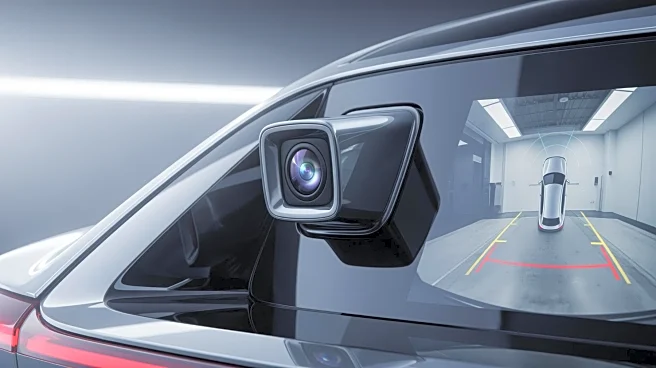What's Happening?
Toyota has announced a recall affecting over a million vehicles due to a defect in the rearview camera system. The issue, as reported, involves software that can cause the camera display to malfunction
under specific conditions, such as when the vehicle is quickly put into reverse after starting or when the car is restarted shortly after being turned off. This defect can result in the camera image freezing for up to 1.8 seconds, posing a potential safety risk if another vehicle or pedestrian is in the path during this time. The recall encompasses various models, including the 2023-2025 Lexus ES, 2024-2025 Lexus GX, 2025-2026 Toyota Camry, 2023-2025 Toyota RAV4, and 2023-2025 Toyota Prius, among others. Toyota has begun notifying affected vehicle owners, offering free software updates to resolve the issue.
Why It's Important?
The recall is significant as it highlights potential safety risks associated with modern vehicle technology, particularly in systems designed to enhance driver awareness and safety. The defect could lead to accidents if drivers are unable to rely on the rearview camera during critical moments. This recall also underscores the importance of software reliability in automotive safety systems. For Toyota, addressing this issue promptly is crucial to maintaining consumer trust and compliance with federal safety standards. The recall may also impact Toyota's reputation and financial performance, as it involves a substantial number of vehicles across multiple models.
What's Next?
Toyota is actively contacting owners of the affected vehicles to provide instructions for obtaining the necessary software updates at authorized service centers. These updates aim to rectify the rearview camera issue and ensure compliance with safety regulations. The company is offering these updates free of charge, which may help mitigate customer dissatisfaction. Additionally, Toyota's handling of this recall will be closely monitored by investors, especially in light of its broader corporate strategies, including a significant privatization plan for its affiliate TICO.
Beyond the Headlines
This recall may prompt broader discussions about the reliability of software in automotive safety systems and the need for rigorous testing before deployment. It also raises questions about the balance between technological advancement and safety assurance in the automotive industry. As vehicles become increasingly reliant on software-driven systems, manufacturers may face growing pressure to ensure these technologies are fail-safe.










